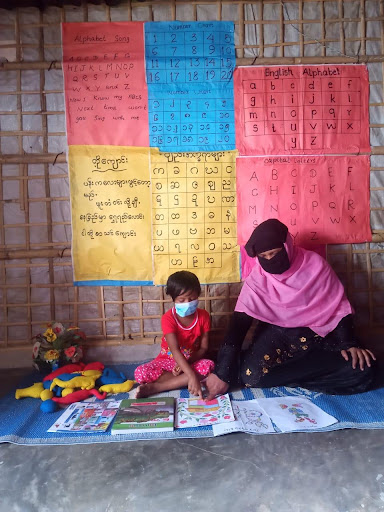Alternative Ways to Continue ECD Interventions During COVID: Learning Form UNICEF Funded EIE Project of Plan International Bangladesh
Background
 Since 2018, Plan International Bangladesh has been implementing a UNICEF-supported education in emergencies programme in Rohingya refugee camps and nearby host communities in Ukhiya upazila (sub-district) under Cox’s Bazar district of Bangladesh. But on 17 March 2020, the Government of Bangladesh had to shut down all government and non-government educational institutions (schools and learning centers) in both camps and host communities due to the COVID-19 pandemic.. This long-time closure of learning centers has worsened the situation, especially for the forcibly displaced Myanmar national (FDMN) children living at different camps in Cox’s Bazar. However, Plan International Bangladesh (PIB) did not leave them alone and continued its education support through different modalities. Among these alternative solutions, the Mini Shishu Bikash Kendro (Child Development Center) and Ghorot Shikkom (Learn at Home) turned out to be signature interventions to continue supporting children aged 3-5 years,their parents and caregivers in camps and host communities.
Since 2018, Plan International Bangladesh has been implementing a UNICEF-supported education in emergencies programme in Rohingya refugee camps and nearby host communities in Ukhiya upazila (sub-district) under Cox’s Bazar district of Bangladesh. But on 17 March 2020, the Government of Bangladesh had to shut down all government and non-government educational institutions (schools and learning centers) in both camps and host communities due to the COVID-19 pandemic.. This long-time closure of learning centers has worsened the situation, especially for the forcibly displaced Myanmar national (FDMN) children living at different camps in Cox’s Bazar. However, Plan International Bangladesh (PIB) did not leave them alone and continued its education support through different modalities. Among these alternative solutions, the Mini Shishu Bikash Kendro (Child Development Center) and Ghorot Shikkom (Learn at Home) turned out to be signature interventions to continue supporting children aged 3-5 years,their parents and caregivers in camps and host communities.
Extended Shishu Bikash Kendro (Child Development Center)
Shishu Bikash Kendro (SBK) is a center-based child development model for children ages 3–5. Extended SBK is a mini form of the SBK model. Our aim was to create a Extended SBK center within learners’s homes by engaging parents and caregivers during the long-term center closure and COVID restriction. Parents and caregivers play a vital role in this mini SBK approach.
 Plan International Bangladesh supported parents and caregivers by providing guidance on howto develop and collect low cost, free, and unused learning and playing materials and how to use thems for their childrens’ holistic development. Plan International Bangladesh also provided some materials, such as- cloth, color, paper, thread, cotton etc., and trained the parents in small groups to make and use the materials during playful learning activities for their children. As a result, a majority of parents and caregivers can now regularly spend quality time with their children using low-cost and free local materials (e.g. fish, cats, tigers, elephants, bananas, mangoes, birds, puppets, dolls, etc.) Parents and caregivers decorated a place for their children with different charts and materials to make them feel a similar environment as SBK. Parents and caregivers taught their children about following a routine, and facilitators supported them regularly through home visits.
Plan International Bangladesh supported parents and caregivers by providing guidance on howto develop and collect low cost, free, and unused learning and playing materials and how to use thems for their childrens’ holistic development. Plan International Bangladesh also provided some materials, such as- cloth, color, paper, thread, cotton etc., and trained the parents in small groups to make and use the materials during playful learning activities for their children. As a result, a majority of parents and caregivers can now regularly spend quality time with their children using low-cost and free local materials (e.g. fish, cats, tigers, elephants, bananas, mangoes, birds, puppets, dolls, etc.) Parents and caregivers decorated a place for their children with different charts and materials to make them feel a similar environment as SBK. Parents and caregivers taught their children about following a routine, and facilitators supported them regularly through home visits.
Facilitators visited each learners’ house twice a week and spent one day with children and another with the parents and caregivers. During their visit, they provided hands-on support including demonstrating, to the children, their parents, and caregivers. Mentors and Technical Officers followed up regularly through mobile phone, WhatsApp or Skype groups as field movement was restricted for a long time. During periods of lighter restrictions, Mentor and TOs were able to visit in person.
Ghorot Shikkom (Learn at Home)
Plan International Bangladesh developed an illustrated book that supports parents and caregivers to learn different activities they can do with their children. The book primarily uses illustrations in order to reach parents and caregivers of all educational level (illiterate, semi-literate, and literate). This book includes 24 exercises, like hand washing, wearing masks, Make Toys Together, Hear and Fly, Throw and Catch the Ball, Make Patterns, Building and Stacking, Play Together, making kites, and playing together and encourages parents to practice them with their children. The project team ensured to disseminate the book among the learners’ families with proper instruction. Facilitators also followed-up on the use of the book during their home visits.
Responding to the Challenge of COVID-19
Due to COVID-19 pandemic, thousands of children, including Rohingya children, were deprived of access to learning in Cox’s Bazar District. In this circumstance, the availability of child-oriented play and learning materials in the house and the engagement of parents and caregivers can play an essential role in continued learning at home, especially where there is no access to technology. Plan International Bangladesh has undertaken a plan to establish mini SBK in all learners’ (3-5 years children) homes for caregiver-led-education. To track the program’s progress, distance monitoring systems and guidelines were developed. Responsibilities were given to volunteers and field-level staff. It was decided that remote meeting, discussion, communication, and information sharing process would be taken through WhatsApp, IMO, Messenger and Skype. The respective host community mentors and technical officers shared messages over phone, WhatsApp, IMO, Messenger, Skype with facilitators and volunteers.
How These Approaches Impacted Learners:
 Parental engagement in children’s learning played an important role in child development, especially for the early aged children during COVID-19 and the closure of learning centers.
Parental engagement in children’s learning played an important role in child development, especially for the early aged children during COVID-19 and the closure of learning centers. - Children get the chance to continue learning at home through their parents and caregivers’ support and engagement.
- It protects them from different kinds of risks, such as COVID, abuse, neglect, exploitation and drop out, etc.
- It promotes their holistic development through a number of low-cost, free local learning and play materials.
- It helps parents to keep their children in the house during COVID-19 pandemic while continuing their children's development support.
- Facilitators developed good relationships with the learners’ through regular home visits which helped us to track the learners’ and reduce the learner drop-out risk.
- Learners have made significant progress in all 4 major domains ( Physical development, Cognitive development, Language development, and Socio-emotional development) of early childhood development.
Our Reward:
- Appreciation from the Refugee Relief and Repatriation Commissioner (RRRC) of Bangladesh when he visited our programmes in Camp-1W.
- Camp in Charges (CiCs) of different camps highly appreciated the approach and asked other NGOs and agencies to follow a similar approach to keep the children inside the home during the pandemic.
- Caregivers, parents and community members said that their children were motivated by their siblings. Family members were able to assist the children if they had trouble understanding or accessing the learning activities.
About the Author:
 Md. Ramjan Ali is working with Plan International Bangladesh as Manager, Early Childhood Development and leading a large ECD project implementing in Dhaka and Barisal division of Bangladesh. He is an education professional with over 8.5 years direct experience in development and humanitarian settings. He has great interest and expertise in ECD, Primary Education, Education in Emergency and Educational Research.
Md. Ramjan Ali is working with Plan International Bangladesh as Manager, Early Childhood Development and leading a large ECD project implementing in Dhaka and Barisal division of Bangladesh. He is an education professional with over 8.5 years direct experience in development and humanitarian settings. He has great interest and expertise in ECD, Primary Education, Education in Emergency and Educational Research.
The views expressed in this blog are the author's own.



